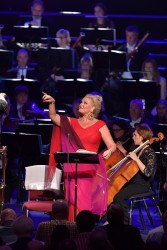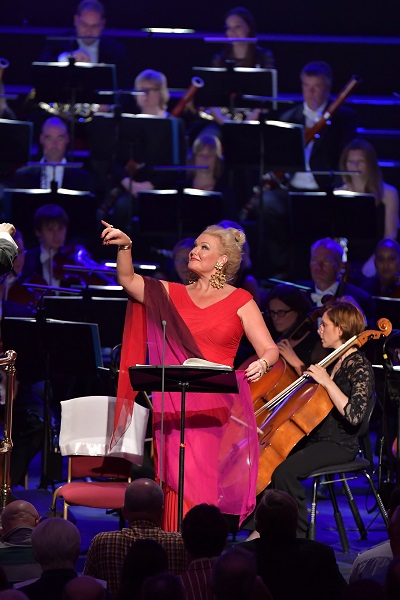
 United Kingdom Prom 45 – Janáček, The Makropulos Affair (sung in Czech): Soloists, BBC Singers, BBC Symphony Orchestra/Jiří Bělohlávek (conductor). Royal Albert Hall, London. 19.8.2016. (JPr)
United Kingdom Prom 45 – Janáček, The Makropulos Affair (sung in Czech): Soloists, BBC Singers, BBC Symphony Orchestra/Jiří Bělohlávek (conductor). Royal Albert Hall, London. 19.8.2016. (JPr)

Karita Mattila (Emilia Marty)
Aleš Briscein (Albert Gregor)
Gustáv Beláček (Dr Kolenatý)
Jan Vacík (Vítek)
Eva Štěrbová (Kristina)
Svatopluk Sem (Baron Jaroslav Prus)
Aleš Voráček (Janek)
Jan Ježek (Hauk-Šendorf)
Jiří Klecker (Stage Technician)
Yvona Škvárová (Cleaning Woman)
Jana Hrochová Wallingerová (Chambermaid)
Kenneth Richardson (stage director)
I have only seen The Makropulos Case once before (over 30 years ago at English National Opera) and was keen to renew acquaintance, especially since Karita Mattila was Emilia Marty. I knew it was to be a concert performance but these days that can mean a multitude of different experiences. A stage director, Kenneth Richardson, was listed and the mostly Czech roster of singers hinted that they may have been involved in a staging and would know their roles. A row of music stands suggested otherwise and there was minimal acting and interaction between the singers. Surely Kenneth Richardson can have added nothing; apart from the images of law books, red phone, roses, coins, a photo of Karita Mattila, a hair comb, documents etc. we saw from time to time as the story unfolded. These could only have confused those not following the libretto in the programme. Basically on occasions like this the audience in the Royal Albert Hall is only there to help cover the costs but mostly to bring some atmosphere to the concert just like the one at Strictly Come Dancing provides the standing ovations and that at Mrs Brown’s Boys is there to laugh.
Perhaps not having a staging is a good thing because The Makropulos Affair is infamous for Richard Versalle’s death during the premiere of the opera at the New York Met in January 1996. The story is about the quest for immortality but sadly the 63-year-old suffered a heart attack and fell about 20 feet to his death during the opening scene. Previously a celebrated heroic tenor remembered especially for Tannhäuser at Bayreuth – but by then specialising in character parts – he portrayed Vítek, a lawyer’s clerk. The director, Elijah Moshinsky, had him climbing up and down a towering ladder with papers in one hand. His fall came after a tragically prophetic line, ‘You can only live so long’!
This was Janáček’s penultimate opera composed between 1923 and 1925. He wrote his own libretto based on the play with the same name by Karel Čapek with its science fiction-like plot. Like much of the composer’s later work, his inspiration was an infatuation with Kamila Stösslová, a married woman much younger than Janáček. Apparently Emilia Marty – with her brash, superior and manipulative exterior disguising her inner vulnerability – represented one aspect of Stösslová.
The inheritance case of Gregor against Prus has spanned the generations but takes an unexpected turn when a famous singer, Emilia Marty, turns up with astonishingly detailed information about the past. All the men involved in the dispute fall head-over-heels for this alluring woman. She is mysterious and magnetic and an incarnation of das Ewig-Weibliche (‘the eternal feminine’). Love appears to mean nothing to her and she just uses sex for her own ends. Marty beds Prus who is in possession of the old document she needs: The Makropulos ‘stuff’. Janáček’s Věc Makropulos has almost as many identities as his heroine and is also known as The Makropulos Affair, aka The Makropulos Case or Secret or, literally, Thing. His fantasy centres around the story of 337-year-old Elina Makropulos. At 16 her father was forced to test a life-prolonging elixir on her. Ever since she has outlived lovers and offspring, constantly moving from country to country and changing identities but each with the initials E.M. She can age but then seeks out the formula to stave it off once more. At the end of the opera after speculating on the meaning of mortality and reflecting on her 300 years’ of loneliness, Marty is tired of her eternal life and ages rapidly. At this performance Kenneth Richardson respected Janáček’s stage direction by beginning the final scene – which is harrowing but deeply moving – with green light at the back.
Musically The Makropulos Affair is something of a hotchpotch with little in the way of thematic development. In the huge programme there was only a short instruction to the opera by Professor Jan Smaczny who notes how the composer ‘delineates character with unerring skill’ and comments on the rapid exchanges of legalese in Act I and ‘Gregor’s febrile nervousness, Kristina’s breathless infatuation with Marty, and Kolenatý’s dry, legalistic responses.’ I would highlight the senility-in-music that is a feature of the old roué Hauk-Šendorf. Professor Smaczny adds how Janáček captures Marty’s ‘multifaceted nature: imperious, dismissive, seductive, but [also] achingly tender.’ It is only in the closing pages of Act III when Makropulos’s insecurity is revealed that the music taps into and evolves a richer, more lyrical vein that until this point in the story has only been heard occasionally.
With mostly native Czech speakers in the cast they were perfectly at ease with Janáček’s conversational lines. Supporting Karita Mattila’s Emilia Marty was a resilient cast and I will just single out a few singers but it does not mean they were better or worse than the rest. Everyone found the composer’s high lying lines and orchestral climaxes difficult to cope with at times. Svatopluk Sem was a suitably stuffy Prus whose ego is easily bruised; Aleš Briscein’s robust tenor showed promise as the ardent romantic Gregor; the very petite Eva Štěrbová was an engaging Kristina; and Jan Ježek got full comedic value out of his small cameo as the doddery Hauk-Šendorf.
Which brings me to the all-important role of Emilia Marty, the wise and world-weary diva who having lived for 337 years renounces the secret of eternal life. She must provide a powerfully erotic focus to this wry tragedy as well as seeming bigger than life. Appearing as a ‘woman in red’ (surely not a coincidence?), Karita Mattila alone made this opera worth seeing and hearing. There was an opulence to her middle range and she sang the difficult notes well enough, if not always with ease. At times there was some cartoonish, diva-ish hand gesticulation and fiddling with a series of shawls and veils: I was reminded of Norma Desmond in Sunset Boulevard too often for my liking but her performance fitted the occasion. Eyes needed to be mostly on her …and they were!
The BBC Symphony Orchestra’s conductor laureate, Jiří Bělohlávek, conducted with authority music that he clearly loves and which cannot be anything other than in his blood. His musicians – with whom he has had much success over the years – did not let him down. They roared with romantic passion in the climaxes, mostly – though not always – helping their conductor keep the vocal line in balance. Despite much persuasive turbulence, Bělohlávek stressed telling instrumental nuances and was always respectful of the conflicting needs for transparency and propulsion. Without his curly hair I hardly recognised him and hope his shaven head is a lifestyle decision and not a result of any illness.
Before concluding my review, I must address a couple of issues that arose from this Prom. Possibly my favourite cartoon character’s favourite saying is ‘That’s all I can stands – I can’t stands no more!’. Arriving at the Royal Albert Hall to collect my ticket (another story in itself) I was handed the programme which approached the size of an old telephone directory (remember them?). Not to mince words …in 2016 this is crazy! There are already LED screens behind the orchestra that can apparently be used to display fairly irrelevant images throughout the concert but – more importantly – can apparently put up ‘Emilia’s Hotel Room’ and ‘Meine liebste Ellian’ but not show enough of the translation to the vast majority of the audience. Those in the uppermost seats could have some additional screens and thus many trees could be saved as well as avoiding all the fluttering of pages being turned or eyes needing to squint in the gloomy auditorium lighting.
There is also clear evidence that few of the audience actually buy the programme or read it if they do. The latter resulted in someone behind me announcing at the interval ‘I had better quickly read the synopsis and find out what’s going on … I didn’t understand at all what happened in Acts I and II.’ The audience was extremely elderly (across the aisle from me someone was gently slumbering for most of the evening!) and perhaps others’ lack of understanding resulted in the larger number of empty seats after the interval (the hall was far from full anyway). On this point, is it only on the nights I am there but there do not now often seem enough Promenaders to justify all the wasted space in the Arena? Obviously anno domini is taking its toll and there looks as if there is insufficient interest in classical music from a younger generation to keep the numbers up.
Jim Pritchard

As well as being useful at a concert, a printed programme is a memento of the event. My extensive collection of printed programmes stretches back to 1980.
On a visit to London a few weeks ago, I stood in the Arena through Mahler’s Third Symphony and the David Bowie Prom on the same evening. I’m 54 and was by no means the oldest person there. Both Proms together cost £12! The Proms have always been inclusive and it would be a sad day indeed if music lovers couldn’t afford to go.
The Royal Albert Hall is huge and it’s really not surprising that it doesn’t sell out every night for ten weeks.
Thanks Rob for your comment to S&H. Responses like this are always appreciated. I do not wish to suggest I am young and am on my way to being 10 years older than you with a programme collection (mostly in boxes) going back further. I or someone will need to get rid of these eventually! I was worried that most around me at this Prom appeared even older and the gaps in the Arena here (also at the ‘Strictly Prom’ and many I have been to recently) suggests the urge to Promenade is a thing of the past but I appreciate your point about price and inclusivity.